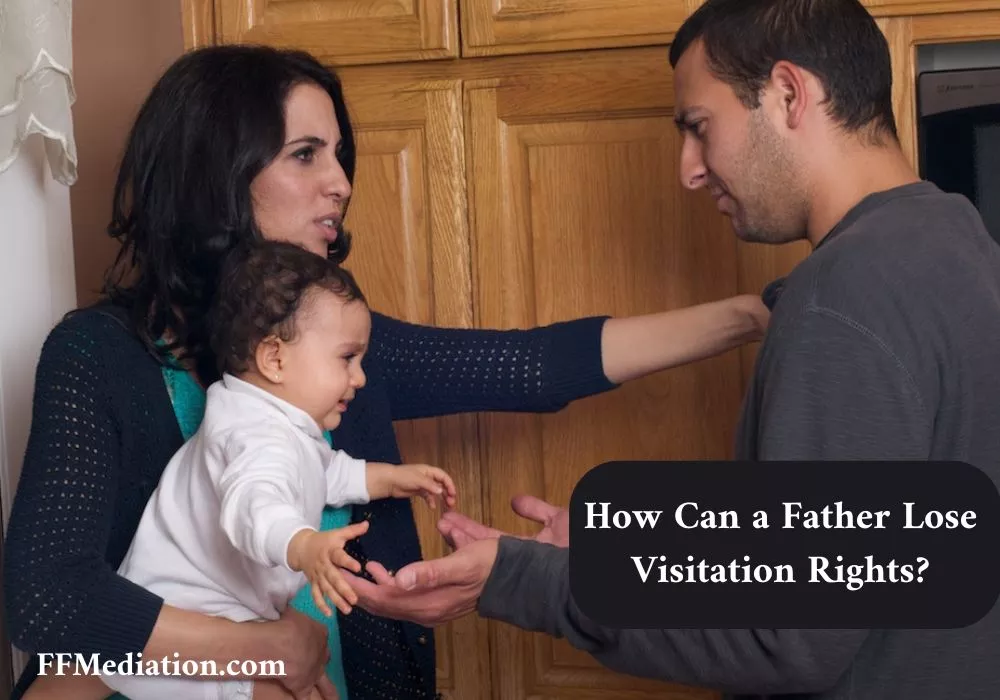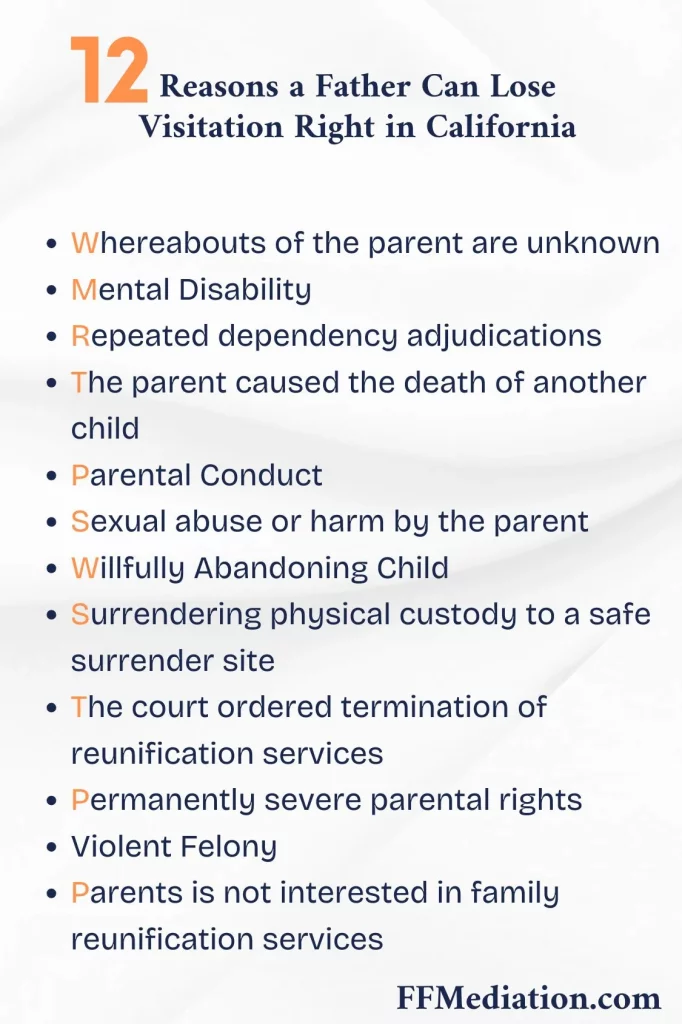Providing Divorce Mediation Services Throughout California
Providing Divorce Mediation Services Throughout California
Home » Divorce and Family law Blog » How Can a Father Lose Visitation Rights? | Top 12 Reasons

If you have visitation rights, your time with your child is limited. It’s important that you maximize the time you have with your child to develop deeper bonds that benefit your child.
However, you may also be concerned that you are going to receive less time if the custodial parent changes their mind.
If that’s a concern you have, it’s important to know how you can lose the visitation you do have. Are you looking for a mediator to help you co-parent or schedule your visitation rights? Don’t wait, reach out to California divorce mediator, Dina Haddad by booking a FREE Father’s Visitation Right Consult.
Visitation rights are as described on the Superior Court of California’s website: “The parent who does not have the children more than half of the time is entitled to visitation with the children. In order to avoid conflicts and eliminate confusion, a specific visitation plan can be developed.”
A father has the right to see his child. Family law professionals, including judicial officers and attorneys, would agree that in most situations keeping communication between both parents is in the child(ren)s best interest. If a parent is harming the child, such as abuse, neglect or drug use, the parent may lose visitation rights, whether fathers or mothers.

Be aware of how you, as a father, can lose custody or your visitation rights. Knowledge is key. We have listed several of these below.
However, don’t focus on this aspect of your visitation. Instead, focus on how to maximize the time you do have with your child so that you develop deep healthy bonds.
Here is a list of 12 grounds from the Child Welfare Information Gateway as to reasons a parent may not receive custody, with our added explanation.
Even if a parent is subject to one or more on this list, the courts can also choose other options like monitored visitation, rehabilitation therapies, and other strategies, when the child-parent relationship can exist healthily and safely:
You don’t have an address so that you can be reached. This has two implications.
The parent is suffering from a mental disability that renders him or her incapable of utilizing those services. It’s not that they want to take custody right away if you have any mental illness on your record. It’s only if:
The child or a sibling of the child had been removed from the custody of his or her parent as a result of an adjudication of dependency due to physical or sexual abuse, the child had been returned to the custody of the parent, and the child is being removed again due to additional physical or sexual abuse.”
This one is pretty self-explanatory, if a parent continues to behave this way putting their child in danger, the custodial parent will be able to prevent that parent from having any visitation time.
The parent has caused the death of another child through abuse or neglect. In such a serious situation, the court may not award any visitation time to that parent. If the parent has been rehabilitated, there is the possibility of other options like monitored visitation.
The child was brought within the jurisdiction of the court under Welfare and Institutions Code $300(e) because of the parent’s conduct.” This refers to a legal section in which a young child is taken from a parent because of severe abuse.
The parent has inflicted severe sexual abuse or severe physical harm to the child, a sibling, or a half-sibling.
The parent of the child willfully abandoned the child, and the court finds that the abandonment itself constituted a serious danger to the child.
The parent or other parent having custody of an infant voluntarily surrendered physical custody of the child to a safe-surrender site pursuant to $1255.7 of the Health and Safety Code.” If you take your child to a designated safe-surrender site during your visitation time, the court has to follow the legal process to ensure the child’s safety.
The court ordered termination of reunification services for any siblings or half-siblings of the child because the parent failed to reunify with the sibling or half-sibling after the sibling or half-sibling had been removed from that parent, and this parent has not subsequently made a reasonable effort to treat the problems that led to removal of the sibling or half-sibling from that parent.
The parental rights of a parent over any sibling or half-sibling of the child had been permanently severed, and the parent has not subsequently made a reasonable effort to treat the problems that led to removal of the sibling or half-sibling of that child from the parent.
The parent of the child has been convicted of a violent felony.
The parent of the child has advised the court that he or she is not interested in receiving family reunification services or having the child returned to or placed in his or her custody.
The custodial parent can file a request to terminate the parent’s visitation rights. If the parents already have a family law case, this request will be within that matter.
If the parents do not, the parent will first file a paternity or divorce action. Then, the parent can file a request for order for child custody. The custodial parent will need to state their position and support it with facts, which could include emails, social media posts, and what they saw and heard.
Except for emergency situations, the matter will be in a hearing before the judge. For emergencies, it depends on the county’s rules as to the process. At the hearing, the parties must have properly entered their pleadings and evidence. The judge should have these by the court deadlines.
In long-cause hearings, you may even call witnesses to testify and present reports or other evidence to which they are privy. The judge will consider all of the facts to determine whether the parent’s visitation should be terminated or not granted at all.
After your rights have been terminated, you can submit an appeal to make the judge reconsider your position. You will have to file through the court system – and note that this will involve additional hearings.
In the meantime beforehand you should take a look at why the judge took your rights in the first place and actively change that. For example — if your home was deemed unfit/hazardous, you should put in the work to make your home safe.
Do you have a question regarding Father’s visitation rights? Our mediators experts in father’s visitation rights can help you. Book your FREE “Fathers Visitation Right” consult today.
There are two very important ways to protect your visitation rights; (1) find a manner that you and the custodial parent can work out your conflict; and (2) work on being the best parent you can to your child.
The best way for you to protect your visitation rights is through collaborative processes, like mediation. By using mediation, you can have a third party present to help both you and your co-parent discuss the schedule. Your mediator can help you find solutions while they promote a collaborative setting.
Let’s say that you and your co-parent don’t get along at all. It turns into a fight every time and you are tired of having your co-parent find any reason to try and take your rights.
A mediator can help you in this case as well. The best service in California for this would be Families First Mediation. You can reach out and schedule a FREE Divorce Mediation Consultation today. The team works to provide families with quality visitation service.
Read More: How to Win Child Custody Mediation?
A father can lose his visitation rights if the co-parent has evidence to prove to court that they are unfit to be taking care of the child(ren) during his time.
There are many reasons. If the father has actively put the child in any sort of danger, the courts can decide that he is unfit. They can revoke his visitation rights and the co-parent no longer has a legal obligation to allow him to see their child(ren).
Yes, if the parent does not oblige by the rules given to them when the visitation rights started, or puts the child at risk during their time, their rights can be taken away.